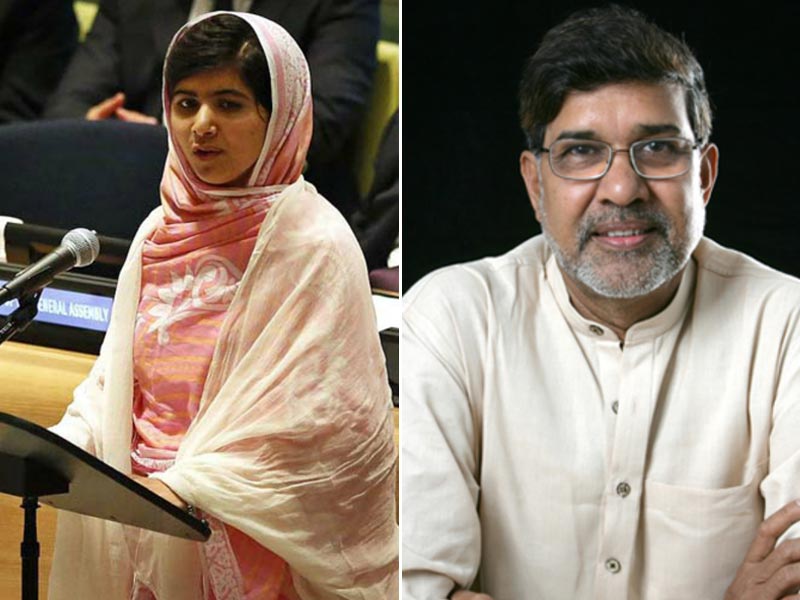Nobel Prize For Faith Or Merit?
Pakistan's Malala Yousufzai and India's Kailash Satyarthi
The Nobel Committee regards it as an important point for a Hindu and a Muslim, an Indian and a Pakistani, to join in a common struggle for education and against extremism. -Nobel Peace Committee Press Release
NEW DELHI: I am confident that I am not the only person in India who found this assertion from the Nobel Committee deeply patronizing. It makes subtle references but the import is very clear. Underlying this statement are certain premises which need to be underlined and perhaps challenged.
The first and the foremost is that it is difficult if not impossible for an Indian and a Pakistani to work together for a struggle against extremism and for education. I reject this contention in its entirety and am quite frankly surprised that it has not yet been taken up by the mainstream media. It is unfortunate that the Nobel Committee did not feel it necessary to acquaint itself with the very large constituency that exists in both the countries against extremism. There are subtle differences in their comprehension hence their approach to this vexatious issue but their commitment is sincere. And this has been in evidence for decades. The august body's unfamiliarity with this phenomenon is astounding to say the least.
The second premise is even more bizarre. While it is true that Malala subscribes to the Islamic faith and Satyarthi is a practicing Hindu, their faiths are by no means central to the body of work that brought them this honour. I am not aware of the figures, but I am sure that the children Satyarthi rescued subscribed to different faiths and that religion was never an impetus which propelled him in his noble endeavours. Similarly Malala's struggle for girls to be accorded the right to education cuts across all the boundaries of religion. The reference to their respective religions somehow seemed inappropriate and misplaced.
It is true that the nationalities of the winners are traditionally identified. Most laureates are however honoured for their work which enhances humanity hence makes their national identities irrelevant. Satyarthi has been able to extend at least the philosophy that guides him well beyond the boundaries of the Indian Republic .Similarly Malala has become an inspiration not just for girls in Pakistan but all over the globe.
I fail to understand why it was felt necessary to lay special emphasis on their respective nationalities and religions. I am old enough to remember the 1976 awards to Betty Williams and Mairead Corrigan. It was very obvious that both of them were accorded this honour for attempting to bridge a religious divide that existed for a long time-and in many ways still exists- there was absolutely no direct reference to their Roman Catholic faiths. I also remember the occasion when Arafat,Peres and Rabin were honoured. Nowhere in the press release did I find any reference to Islam and Judaism. Similarly when John Hume and David Trimble shared the award, there was no reference to their faiths in the announcement press release.
All this engenders an uncomfortable felling within me that the Committee harboured a belief that religious identities were more fundamental to the people in India and Pakistan than the other parts of the globe. Having worked all over the the world, I find that premise completely fallacious.
If this reference,as has been suggested, is an attempt to get the two countries viz India and Pakistan closer, it can only be described as supremely immature. The fundamental problems between India and Pakistan are political and religion only happens to be of incidental relevance at the best. If the Committee seems to have fallen prey to the misconception that India equates Hindu and Pakistan equates Muslim , then they could not be further from the truth -as evidenced by more Muslims living in India than Pakistan.
Neither Malala nor Satyarthi are in any direct position to alter the uneasy equation between the two countries as they maintain their distance from politics. In fact Malala's detractors viz. the Taliban have had closet supporters within the Pakistani administrative apparatus for years. The person who shot her is still at large. At the most ,the two of them can only indirectly affect the relationship between the two countries.
I must add here though that I am delighted that the award has come to Satyarthi -it was long overdue after his relentless work over several decades which fetched him honours from every country except his own. Until now,I have not heard any clamour from the usually vocal political class masquerading as public servants that this remarkable man be bestowed the Bharat Ratna-as they did so for their political icons whose contributions are questionable and fade into insignificance before this remarkable man. I take this opportunity to state that this man should be accorded the nation's highest honour and that his claim is greater than any of the politicians whose names have been suggested.
In Malala's case, while I am delighted for the remarkable girl, I cannot help feeling that the honour was somewhat premature. Let us however applaud her exemplary indomitable spirit and hope that she serves as a role model for young girls all over the world. My fondest blessings to her!





